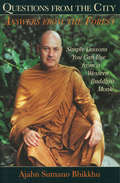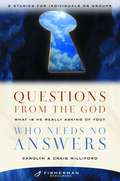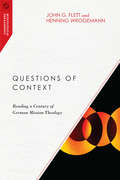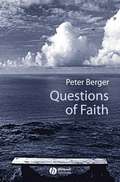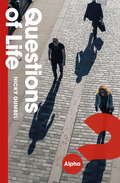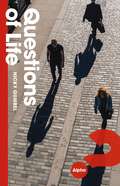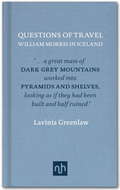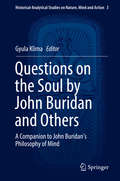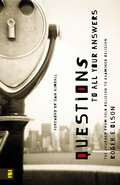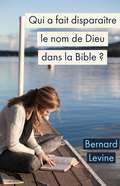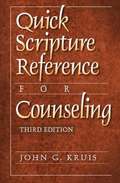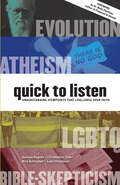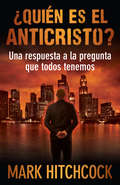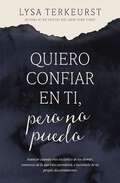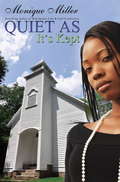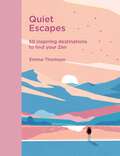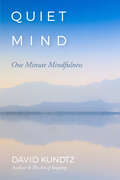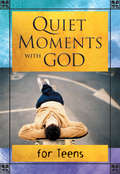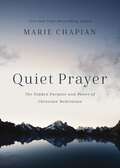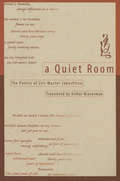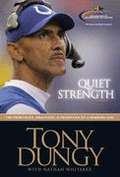- Table View
- List View
Questions from the City, Answers from the Forest
by Ajahn Sumano Bhikkhu"Sincere inquiry always sparks our movement towards truth. Deep questions signal the manifestation of the very energy through which we outgrow ourselves." -- from the Introduction.Born in Chicago, a law school graduate and real estate professional, Ajahn Sumano abandoned his comfortable American lifestyle for the begging bowl and simple cave home of an ordained Buddhist monk in the tradition of the Thai forest meditation masters. In 1994-95, he conducted a series of question and answer evenings at a guest house in Thailand's Kowyai National Park with English-speaking tourists eager to meet a Western Buddhist monk. The heartfelt questions of these "city" people and the clear and penetrating answers Sumano gave from his "forest" perspective form the basis of this remarkable book.Written on a battered, battery-powered laptop in his meditation cave, Sumano's enchanting personal story and his refreshingly down-to-earth blend of American sensibility and Eastern practice will fascinate newcomers to Buddhist ideas as well as experienced practitioners.
Questions from the City, Answers from the Forest
by Ajahn Sumano Bhikkhu"Sincere inquiry always sparks our movement towards truth. Deep questions signal the manifestation of the very energy through which we outgrow ourselves." -- from the Introduction.Born in Chicago, a law school graduate and real estate professional, Ajahn Sumano abandoned his comfortable American lifestyle for the begging bowl and simple cave home of an ordained Buddhist monk in the tradition of the Thai forest meditation masters. In 1994-95, he conducted a series of question and answer evenings at a guest house in Thailand's Kowyai National Park with English-speaking tourists eager to meet a Western Buddhist monk. The heartfelt questions of these "city" people and the clear and penetrating answers Sumano gave from his "forest" perspective form the basis of this remarkable book. Written on a battered, battery-powered laptop in his meditation cave, Sumano's enchanting personal story and his refreshingly down-to-earth blend of American sensibility and Eastern practice will fascinate newcomers to Buddhist ideas as well as experienced practitioners.
Questions from the God Who Needs No Answers: What Is He Really Asking of You? (Fisherman Resources Series)
by Craig Williford Carolyn WillifordThe God Who Wants Us to Know HimWhy would an omnipotent God ask questions of people? Because the questions are not for him; they are for us. In Questions from the God Who Needs No Answers, authors Carolyn and Craig Williford show how God's inquiries in the Old Testament reveal who he is and how he wants to be in relationship with us.From "Where are you?" to "Is anything too hard for the Lord?" and "Am I not sending you?" God's questions encouraged and challenged biblical characters-and they can teach us the same powerful truths today. This in-depth Bible study will help you: ·Discover a deeper and more intimate relationship with God·Gain a better understanding of the people God questioned in the Bible ·Learn to use God's questions to unravel the assumptions you have about God's character and capabilities·Uncover and study the truths of the Bible and how they apply to us today.Through description, guided reading, and interactive questions, Carolyn and Craig Williford reveal a God whose timeless questions call us to a deeper faith in him.From the Trade Paperback edition.
Questions of Context: Reading a Century of German Mission Theology (Missiological Engagements)
by Henning Wrogemann John G. FlettThe gospel is for every tribe, tongue, and nation (Revelation 7:9), but there is no single biblical or theological model for the relationship between the gospel and these diverse cultures. Indeed, every suggested approach carries its own range of philosophical and theological commitments that all too often remain unexamined. Contextualization is fraught with challenges—yet wrestling with questions of context is essential for how we understand mission, theology, and the embodiment of the Christian faith. German missiology has engaged these questions in a variety of ways that can both inform and critique Anglo-American traditions. In this compilation and analysis, John Flett and Henning Wrogemann translate and comment on a core thread of German missiological works, explaining both their historical and current significance. Drawn from journals and books across a century of academic discourse, these classic writings trace developments from Gustav Warneck, the father of contemporary missiology, through key thinkers such as Karl Hartenstein, who coined the term missio Dei, down to twenty-first century discussions of intercultural hermeneutics. Along the way they reveal advances, mistakes, and changing definitions as German missiologists interacted with the cultural and political realities of their time. This longitudinal study, showcasing many texts available in English for the first time, tackles the history and dynamics of contextualization head-on and sheds new light on the state of missiology today. We are reminded, Flett and Wrogemann argue, that we must keep working to honor difference within the worldwide Christian community as necessary to the fullness of our being in Christ.
Questions of Faith: A Skeptical Affirmation of Christianity (Religion and Spirituality in the Modern World)
by Peter BergerLeading religious and cultural commentator, Peter Berger, explores how and what we can believe in modern times. Deals clearly with questions such as ‘Does God exist? What was so special about Jesus? How can one be Christian in a pluralistic society? Structured around key phrases from the Apostles’ Creed. Draws on the Christian theological tradition and the work of other relevant thinkers, such as Freud and Simone Weil. The author takes the position of an open-minded sceptic, exploring his own beliefs.
Questions of Life: An Opportunity to Explore the Meaning of Life (ALPHA BOOKS)
by Nicky Gumbel'What Alpha offers, and what is attracting thousands of people, is permission, rare in secular culture, to discuss the big questions of life and death and their meaning.' - The Guardian'Alpha makes Christianity relevant to modern life.' - The ExpressIn this international bestseller, Alpha pioneer Nicky Gumbel addresses some of the foundational questions of life that challenge us all: why am I here? Is there more to life than this? How can I make the most of the rest of my life?Answering step-by-step some of the key questions that lie at the heart of the Christian faith, his intelligent, well-researched and informed approach makes this a sympathetic, fascinating and immensely readable introduction to Jesus Christ.'Alpha was the best thing I ever did. It helped answer some huge questions and to find a simple, empowering faith in my life.' - Bear Grylls
Questions of Life: The Basis Of Tv's Alpha - Could It Change Your Life (The\alpha Course Ser.)
by Nicky GumbelFrom "Why am I here?" to "What's next?" in this international bestseller, Alpha pioneer Nicky Gumbel addresses some of the foundational questions that challenge us all. Questions of Life is a step-by-step guide to the basics of the Christian faith by one of the world's most respected Christian leaders. This book contains the talks that are given on Alpha, and in it Nicky explores key themes, questions, and objections to faith, leading us on an engaging, personal journey of discovery.Alpha creates an environment of hospitality where people can bring their friends, family, and work colleagues to explore the Christian faith, ask questions, and share their point of view. Alpha makes it easy to invite friends to have spiritual conversations which explore life's biggest questions in a safe and respectful way.Alpha's approach to hospitality, faith, and discussion is designed to welcome everyone, especially those who might not describe themselves as Christians or church-goers. Each session includes time for a large group meal, short teaching, and small group discussion.
Questions of Travel: William Morris in Iceland
by Lavinia GreenlawPoet and novelist Lavinia Greenlaw's poetic reflections on William Morris's Icelandic Journal, one of the overlooked masterpieces of travel literatureThe great Victorian designer and decorative artist William Morris was fascinated by Iceland and wrote a book documenting his travels there. He gets caught up with questions of travel, noting his reaction to the idea of leaving or arriving, to hurry and delay, what it means to dread a place you’ve never been to or to encounter the actuality of a long-held vision. He is sensitive to the emotional landscape of his band of travelers and, above all, continuously analyzing and fixing this “most romantic of all deserts.”Lavinia Greenlaw follows in his footsteps, and interposes his prose with her own “questions of travel.” The result is a new and composite work that brilliantly explores our conflicted reasons for not staying at home.
Questions on the Soul by John Buridan and Others
by Gyula KlimaThis volume features essays that explore the insights of the 14th-century Parisian nominalist philosopher, John Buridan. It serves as a companion to the Latin text edition and annotated English translation of his question-commentary on Aristotle's On the Soul. The contributors survey Buridan's work both in its own historical-theoretical context and in relation to contemporary issues. The essays come in three main sections, which correspond to the three books of Buridan's Questions. Coverage first deals with the classification of the science of the soul within the system of Aristotelian sciences, and surveys the main issues within it. The next section examines the metaphysics of the soul. It considers Buridan's peculiar version of Aristotelian hylomorphism in dealing with the problem of what kind of entity the soul (in particular, the human soul) is, and what powers and actions it has, on the basis of which we can approach the question of its essence. The volume concludes with a look at Buridan's doctrine of the nature and functions of the human intellect. Coverage in this section includes the problem of self-knowledge in Buridan's theory, Buridan's answer to the traditional medieval problem concerning the primary object of the intellect, and his unique treatment of logical problems in psychological contexts.
Questions to All Your Answers: The Journey from Folk Religion to Examined Faith
by Roger E. OlsonMany evangelicals have embraced a Christianized ?folk religion? characterized by glib sayings they've never deeply examined. Looking at ten popular Christian slogans in the light of Scripture, this book encourages us to reach for a deeper, well-grounded faith that engages the intellect as well as the heart with the Bible.
Qui a fait disparaître le nom de Dieu dans la Bible ?
by Bernard LevineN'est-il pas choquant que le précieux nom du Saint Père ait été retiré de son propre livre près de 7000 fois. Comment pensez-vous que Dieu se sent ? Qui a fait disparaître le nom de Dieu dans la Bible ? Quand Jésus nous a appris à prier, il a dit : « Notre Père qui es aux cieux Que Ton nom soit sanctifié... » quel nom ? Est-ce « Dieu » ? ce n'est pas Son nom... c'est un titre. Est-ce que le nom est « Seigneur » ? ce n'est pas non plus Son nom... c'est aussi un titre. Quel est le saint nom du dieu que vous servez ? Pourquoi est-il important d'utiliser et de louer le vrai nom de Dieu ? Avez-vous vu ce qui est écrit dans Apocalypse chapitre 14 : verset 1 ? Et aussi dans Apocalypse chapitre 3 ? Saviez-vous que l'une des principales raisons pour lesquelles Jésus est venu sur cette Terre était dans le but de révéler et de faire connaître le saint nom de Son Père. Dans ce livre, vous découvrirez la véritable identité du Dieu d'Israël que la plupart des chrétiens ne connaissent pas.
Quick Scripture Reference for Counseling
by John G. KruisThis revised and expanded third edition is specially designed to help people use the Scriptures more effectively in their lives. Scripture passages, taken from the NIV, on practical topics are thoughtfully arranged in a numbered list so users can see their significance at a glance. With this collection, readers have the pertinent Bible passages at their fingertips when they need them most.
Quick to Listen: Understanding Viewpoints that Challenge Your Faith
by Luke Thompson Samuel Degner Christopher Doerr Nick SchmollerDo you know how to talk to people with different beliefs than yours? Throughout their faith journeys, Christians encounter people with lifestyles, outlooks, and worldviews that test and even defy what they believe. Many Christians don't know how to react to those encounters. How do you have meaningful conversations that don't devolve into heated arguments with people who don't share your beliefs? Your instincts might tell you to refute opposing viewpoints with clever arguments and witty retorts, but those responses can push people away. Even worse, they don't clearly reflect the loving attitude of Jesus. Quick to Listen is made up of open and honest conversations and interviews held by the authors with evolutionists, atheists, Bible skeptics, and friends and members of the LGBTQ+ community. When asked what it meant to have his story shared in this book, one man replied, "It meant there's at least one Christian out there more interested in understanding me than lecturing me." That's what Quick to Listen is all about. It's a helpful tool to instruct you in listening and learning to talk with people who don't share your beliefs as a Christian. It will equip you to acknowledge and understand their experiences and perspectives while also pointing you straight to the Bible to affirm and clarify your faith and beliefs. It will help you build relationships based on genuine Christian compassion so you can share Jesus and his love with them.
Quien es el Anticristo?: Una respuesta a la pregunta que todos tenemos
by Mark HitchcockCon el creciente interés hoy día en el anticristo, se ha despertado la curiosidad de cristianos y de incrédulos... y con buena razón. En los libros, las películas, e incluso las conversaciones cotidianas, abundan tantas ideas distintas acerca de quién es, qué hará, y el momento de su llegada, que resulta difícil separar la realidad bíblica de la especulación humana.Mark Hitchcock, experto en profecía bíblica y autor de éxitos de ventas, busca las respuestas en la única fuente en la que los lectores pueden confiar: la Biblia. Él responde a preguntas tales como...*¿De dónde vendrá el anticristo?*¿Cuándo aparecerá en el escenario de la Tierra?*¿Qué significado tiene el número 666?*¿Cómo ascenderá al poder, y qué le sucederá al final?*¿Sabremos quién es antes del arrebatamiento?Con un formato práctico de preguntas y respuestas, Mark lleva a los lectores por un recorrido fascinante de todos los pasajes clave de la Biblia sobre el anticristo, y explica cómo esta información se aplica hoy a sus vidas.
Quiero confiar en ti, pero no puedo: Avanzar cuando eres escéptico de los demás, temeroso de lo que Dios permitirá, e incrédulo de tu propio discernimiento
by Lysa TerKeurstLysa TerKeurst, autora de best sellers del New York Times, te muestra qué hacer con tu escepticismo y desconfianza para que puedas sanar de las traiciones del pasado y avanzar con fuerza y resiliencia.La confianza es el oxígeno de todas las relaciones humanas. Pero también es lo que te hace tropezar después de haberte quemado. Puede que un amigo te decepcione constantemente. Un líder o una organización que respetas resulta ser diferente de lo que aparenta. Tu cónyuge te engaña. Un familiar te traiciona. Estás agotado por las decisiones de los demás y empiezas a cuestionarte tu propio discernimiento. Y te preguntas: "Si Dios permite que esto ocurra, ¿se puede confiar en Él?&”.¿Cómo puedes vivir bien y avanzar hacia el futuro cuando sigues tropezando con problemas de confianza? Lysa TerKeurst dice que no se trata simplemente de encontrar personas mejores con quienes caminar. Se trata de desarrollar la estabilidad que anhelas dentro de ti y con Dios, para que no te vuelvas cínico y lleves un sistema de creencias equivocado a cada nueva relación. En Quiero confiar en ti, pero no puedo, Lysa te muestra cómo:identificar cuáles de las once banderas rojas relacionales están despertando tu desconfianza, para que puedas determinar con exactitud por qué te sientes incómodo;dejar de tener más fe en que tus miedos se hagan realidad que en que Dios te ayude, haciéndote preguntas cruciales del tipo "qué pasaría si..." para procesar mejor tus dudas;reconocer cuándo puede repararse una relación fracturada considerando una lista razonable de características necesarias para reconstruir la confianza; ycomprender el impacto físico, emocional y neurológico de las traiciones que has experimentado y empezar a sanar desde dentro.En un mundo en el que tantas cosas parecen alarmantes, este libro te dará una paz que no depende de personas, circunstancias o experiencias impredecibles. En su lugar, te ofrece formas prácticas y bíblicas para progresar realmente hacia perspectivas y relaciones más sanas, y hacia un futuro que puedas esperar auténticamente. I Want to Trust You, but I Don't...New York Times bestselling author Lysa TerKeurst shows you what to do with your skepticism and distrust so you can heal from past betrayals and move forward with strength and resilience.How can you live well and step into the future when you keep stumbling over trust issues? Lysa TerKeurst says it's not simply about finding better people to walk with. It's about developing the stability you long for within yourself and with God, so you don't become cynical and carry a broken belief system into every new relationship. In I Want to Trust You, but I Don't, Lysa shows you how toidentify which of the eleven relational red flags are stirring up distrust, so you can pinpoint why you're feeling uneasy;stop having more faith in your fears coming true than God coming through for you by asking crucial "what if" questions to better process your doubts;recognize when a fractured relationship can be repaired by considering a reasonable list of characteristics necessary for rebuilding trust; andunderstand the physical, emotional, and neurological impact of the betrayals you've experienced and start healing from the inside out.
Quiet As It's Kept
by Monique MillerWill Tracy is a good, God-fearing man who had a shaky childhood as he watched his father abuse his mother. But now he's grown and feeling confident and secure that he has finally met the woman he's been praying God would send him to be able feel the security he's always craved. Morgan is beautiful and appears to be the perfect Christian woman. But once Will pledges his life to her, he nearly loses his. . . . After a series of strange, inexplicable "accidents" plague him, he starts to wonder if the woman he married is all that she outwardly appears to be-or if he's indeed sleeping with the enemy. He continues to honor the vows he made to God and to Morgan. But is this wife of his really a gift from God? Or is she the devil in disguise?
Quiet As It's Kept
by Monique MillerWill Tracy is a good, God-fearing man who had a shaky childhood as he watched his father abuse his mother. But now he's grown and feeling confident and secure that he has finally met the woman he's been praying God would send him to be able feel the security he's always craved. Morgan is beautiful and appears to be the perfect Christian woman. But once Will pledges his life to her, he nearly loses his. . . . After a series of strange, inexplicable "accidents" plague him, he starts to wonder if the woman he married is all that she outwardly appears to be-or if he's indeed sleeping with the enemy. He continues to honor the vows he made to God and to Morgan. But is this wife of his really a gift from God? Or is she the devil in disguise?
Quiet Beauty
by Kendall H. Brown David M. CobbQuiet Beauty: Japanese Gardens of North America is an extraordinary look at the most beautiful-and serene-gardens in the United States and Canada. Most Japanese garden books look to the gardens of Japan. Quiet Beauty explores the treasure trove of Japanese gardens located in North America. Featuring an intimate look at twenty-six gardens, with numerous stunning color photographs of each, that detail their style, history, and special functions, this book explores the ingenuity and range of Japanese landscaping.Gardens include: Japanese Tea Garden in Golden Gate Park, San Francisco, California Nitobe Memorial Garden, University of British Columbia, Vancouver, British Columbia Japanese Garden, Fort Worth Botanic Garden, Texas Garden of the Pine Winds, Denver Botanic Gardena, Colorado Japanese Garden, Montréal Botanical Garden, Québec Tenshin'en (The Garden of the Heart of Heaven), Museum of Fine Arts, Boston, Massachusetts Roji'en (Garden of Drops of Dew), The George D. and Harriet W. Cornell Japanese Gardens, The Morikami Museum and Japanese Gardens, Delray Beach, Florida Japanese Friendship Garden of Phoenix, Margaret T. Hance Park, Arizona Garden of the Pine Wind, Garven Woodland Garden, Hot Springs, Arkansas
Quiet Escapes: 50 inspiring destinations to find your Zen
by Emma ThomsonDiscover the world's most peaceful destinations.In Quiet Escapes, award-winning travel writer Emma Thomson curates 50 inspirational trips from across the globe, each carefully selected to help you find your Zen. Including a host of natural wilderness adventures, remote island retreats, sacred pilgrim routes and unexpected oases of quiet in urban areas, this definitive guide equips you with the very best places to unwind and enjoy some true quiet reflection.From stargazing in New Zealand to feeding mind, body and soul in Bali, an art safari in Zambia to a quiet city break in Switzerland, you will be spoilt for choice when planning your next calming escape.
Quiet Escapes: 50 inspiring destinations to find your Zen
by Emma ThomsonDiscover the world's most peaceful destinations.In Quiet Escapes, award-winning travel writer Emma Thomson curates 50 inspirational trips from across the globe, each carefully selected to help you find your Zen. Including a host of natural wilderness adventures, remote island retreats, sacred pilgrim routes and unexpected oases of quiet in urban areas, this definitive guide equips you with the very best places to unwind and enjoy some true quiet reflection.From stargazing in New Zealand to feeding mind, body and soul in Bali, an art safari in Zambia to a quiet city break in Switzerland, you will be spoilt for choice when planning your next calming escape.
Quiet Mind: One Minute Mindfulness
by David KundtzDaily Mindful Minutes are Necessary for StillnessDavid Kundtz offers readers mindful minutes through the power of stillness. In the haste of everyday life, Quiet Mind offers us an extension of time by allotting us moments of healing and self introspection. Find yourself in the spaces between yourself and life. The miracle of mindfulness is a welcome respite for anyone who lives a life that feels nonstop. Connect with your inner self by pausing your thoughts, banishing your self-doubt, and embracing a daily practice of observing a moment of silence. Welcome yourself to a quiet mind. Quiet Mind is an invitation to rest, find peace, awaken, and remember. You will find guidance on using the moments between activities, which the author calls “still points,” as opportunities to focus on becoming more fully awake to who you are at any time, even during one, sacred mindful minute.Inside this mindful moment book, you’ll find:Ways to cultivate a positive mindset to remain open to infinite possibilities of spiritual growthA series of reflections that can assist you with unwinding anxiety blocking your path to spiritual connectionInsight that stems from spirituality and the psychology of introspection If you like how to “be mindful” books like Return to You, Breath, or Each Day a Renewed Beginning, you’ll love Quiet Mind.
Quiet Moments With God For Teens
by Honors BooksThis best-selling devotional series combines a favorite format that has sold millions with content focusing on the inspiration, encouragement, and peace God can give in quiet moments with Him. Each devotional--over 50 in all--contains a powerful scripture, a thoughtful quotation, and a short inspirational story and application of the scripture to contemporary life. Beautiful photos and artwork make this book a joy to behold and a wonderful gift, though once you get a look at it, you'll want a copy for yourself! Quiet Moments with God for Women features stories and verses teens will find meaningful.
Quiet Prayer: The Hidden Purpose and Power of Christian Meditation
by Marie ChapianThe world around us teems with chaos and noise. We can change this turmoil by first changing the turmoil within us. That’s what Quiet Prayer is all about. In Quiet Prayer, bestselling author Marie Chapian introduces readers to the ancient Christian tradition of solitude and meditation—a way of being in the presence of God based on silence and stillness. She answers questions Christians may have, such as:Is it Christian to meditate?What is Quiet Prayer meditation?What are the benefits of Quiet Prayer?Through learning about the history of Christian meditation and practicing with Marie’s step-by-step guided meditations in the book, you can lean deeper into the Lord’s call to “Be still, and know that I am God” (Psalm 46:10).
Quiet Room
by Arthur BravermanThe poetry of Rinzai Zen master Jakushitsu remains as fresh and resonant today as when it was written centuries ago. Now his brilliant, poignant poetry, carefully translated by Zen practitioner Arthur Braverman, is available in English for poetry and Zen enthusiasts to read and savor. This, the most complete selection of Jakushitsu's work, is also put into context by Braverman with thoughtful excerpts from Buddhist scripture and other relevant sources. Here we see the full scope of Jakushitsu's timeless thinking, and along the way gain a greater understanding of Zen practice, the culture of traditional Japan, and of ourselves.
Quiet Strength: A Memoir
by Tony Dungy Nathan WhitakerTony Dungy's words and example have intrigued millions of people, particularly following his victory in Super Bowl XLI, the first for an African American coach. <P><P>How is it possible for a coach―especially a football coach―to win the respect of his players and lead them to the Super Bowl without the screaming histrionics, the profanities, and the demand that the sport come before anything else? <P>How is it possible for anyone to be successful without compromising faith and family? <P>In this inspiring and reflective memoir, now updated with a new chapter, Coach Dungy tells the story of a life lived for God and family―and challenges us all to redefine our ideas of what it means to succeed.
